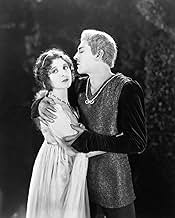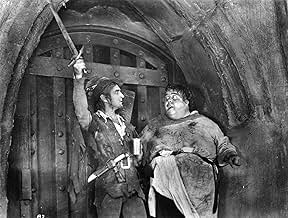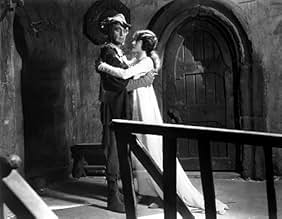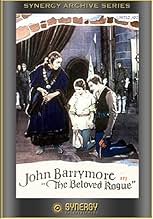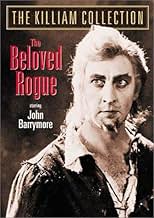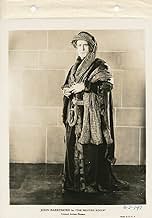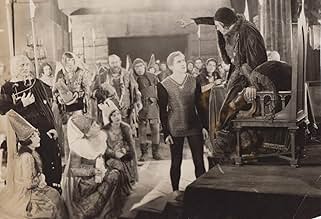IMDb RATING
7.0/10
965
YOUR RATING
François Villon, in his lifetime the most renowned poet in France, is also a prankster, an occasional criminal, and an ardent patriot.François Villon, in his lifetime the most renowned poet in France, is also a prankster, an occasional criminal, and an ardent patriot.François Villon, in his lifetime the most renowned poet in France, is also a prankster, an occasional criminal, and an ardent patriot.
Nigel De Brulier
- Astrologer
- (as Nigel de Brulier)
Otto Matieson
- Olivier
- (as Otto Mattiesen)
Tom Amandares
- Man in Crowd
- (uncredited)
Louise Emmons
- Beggar
- (uncredited)
Martha Franklin
- Maid
- (uncredited)
Featured reviews
Along with DR JEKYLL & MR HYDE, this 1927 action/adventure flick remains one of the best John Barrymore silent vehicles currently available to us. Here "The Great Profile" invades Douglas Fairbanks territory and more than holds his own. There is so much to like about this film that it's hard to know where to begin. Aside from Barrymore's charismatic performance there is the American debut of Conrad Veidt. Just observe his body posture as Louis XI and you'll see what silent screen acting is all about.
Then there is the opportunity to see Mack Swain away from Chaplin and Sennett. The sets by William Cameron Menzies are staggering and the camera work by Joseph August is among the finest in silent film. It was all brought together by Alan Crosland who is best remembered for directing THE JAZZ SINGER although this picture was much more typical of his style.
The print utilized for this DVD is taken from the Killiam Collection and is the same as the one issued by Image Entertainment in 2002. Although it's a little worn in places, the new transfer has better picture quality with the tinted scenes toned down compared to the old Image version.
The William Perry piano score, while not in state of the art sound, has been enhanced and is a great improvement over the previous release. It remains a good example of what a silent piano score should be. A rare opportunity to see John Barrymore in his prime with many other things to savor. It still excites the senses after all these years...For more reviews visit The Capsule Critic.
UPDATE 2024: A 35mm print was recently discovered in the Library of Congress. It has been restored and is a significant improvement over the old Killiam print which had numerous issues. The orchestral score by Robert Israel easily supplants the old William Perry piano score. It's currently available on Blu-ray from Kino.
Then there is the opportunity to see Mack Swain away from Chaplin and Sennett. The sets by William Cameron Menzies are staggering and the camera work by Joseph August is among the finest in silent film. It was all brought together by Alan Crosland who is best remembered for directing THE JAZZ SINGER although this picture was much more typical of his style.
The print utilized for this DVD is taken from the Killiam Collection and is the same as the one issued by Image Entertainment in 2002. Although it's a little worn in places, the new transfer has better picture quality with the tinted scenes toned down compared to the old Image version.
The William Perry piano score, while not in state of the art sound, has been enhanced and is a great improvement over the previous release. It remains a good example of what a silent piano score should be. A rare opportunity to see John Barrymore in his prime with many other things to savor. It still excites the senses after all these years...For more reviews visit The Capsule Critic.
UPDATE 2024: A 35mm print was recently discovered in the Library of Congress. It has been restored and is a significant improvement over the old Killiam print which had numerous issues. The orchestral score by Robert Israel easily supplants the old William Perry piano score. It's currently available on Blu-ray from Kino.
François Villon was a real-life poet and rogue who lived in Paris in the 15th century. However, most of what is portrayed in this historical film is actually fiction--from a play created at the beginning of the 20th century. Whereas in the film he met and became friends with Louis XI, in reality he died in his 30s and was never involved in all the intrigues like he was in this film. In reality, he wrote some lovely verse and was frequently on the wrong side of the law--not the combination of a patriot and Robin Hood-like character like he is in the film. Provided you know that the film is nearly 100% fiction, then it's well worth seeing--just don't assume it's a good history lesson.
In THE BELOVED ROGUE, Villon is played with wild abandon by John Barrymore. I was also pretty excited to see that his three friends were all played by very familiar faces. Angelo Rossitto, who was the plucky dwarf, played in tons of films over the years and had a very long career. Slim Summerville was a character actor known for adding a touch of comedy to films. Mack Swain is best known as the silent film foil in many of Chaplin's short films and played his partner in THE GOLD RUSH. All four of these men did a nice job and have no complaints---even with Barrymore's rather over-the-top treatment that was rather reminiscent of a Douglas Fairbanks performance. However, the performance I had a serious problem with was Conrad Veidt as King Louis XI. To call this "unsubtle" would be a gross understatement. He played the role like a high schooler who thought he was supposed to be the stereotypical Richard III--skulking about and acting like a demoniacal caricature. While Veidt was wonderful in many, many films (both silent and sound) but here he is just ridiculous.
As for the story, it's full of lusty adventure and action--like a swashbuckling film minus the sailing ships. The sets worked out well for all this, as they'd been used the previous year for THE HUNCHBACK OF NOTRE DAME. Both films were set around the same time period.
Overall, it's one of the last great silent films. There's a lot to like and the film is a lovely combination of romance, comedy and action. Well worth seeing, though it loses a couple of points for Veidt's overacting as well as the way the film plays fast and loose with history.
By the way, this film was also made twice as IF I WERE KING (1920 and 1938) and apparently these two films are closest to the original play. However, in total, six films have been about Villon and tell, more or less, variations on the same tale!
In THE BELOVED ROGUE, Villon is played with wild abandon by John Barrymore. I was also pretty excited to see that his three friends were all played by very familiar faces. Angelo Rossitto, who was the plucky dwarf, played in tons of films over the years and had a very long career. Slim Summerville was a character actor known for adding a touch of comedy to films. Mack Swain is best known as the silent film foil in many of Chaplin's short films and played his partner in THE GOLD RUSH. All four of these men did a nice job and have no complaints---even with Barrymore's rather over-the-top treatment that was rather reminiscent of a Douglas Fairbanks performance. However, the performance I had a serious problem with was Conrad Veidt as King Louis XI. To call this "unsubtle" would be a gross understatement. He played the role like a high schooler who thought he was supposed to be the stereotypical Richard III--skulking about and acting like a demoniacal caricature. While Veidt was wonderful in many, many films (both silent and sound) but here he is just ridiculous.
As for the story, it's full of lusty adventure and action--like a swashbuckling film minus the sailing ships. The sets worked out well for all this, as they'd been used the previous year for THE HUNCHBACK OF NOTRE DAME. Both films were set around the same time period.
Overall, it's one of the last great silent films. There's a lot to like and the film is a lovely combination of romance, comedy and action. Well worth seeing, though it loses a couple of points for Veidt's overacting as well as the way the film plays fast and loose with history.
By the way, this film was also made twice as IF I WERE KING (1920 and 1938) and apparently these two films are closest to the original play. However, in total, six films have been about Villon and tell, more or less, variations on the same tale!
The Beloved Rogue is a wonderful period piece. It portrays 145th century Paris in grand Hollywood fashion, yet offering a bleaker side to existence there as it would be experienced by the poor. And the snow. It's constantly swirling about, adding to the severity of the setting -- brilliant! The setting is enhanced by the odd cast of characters, including beggars, cripples and dwarfs.
A brilliant performance is turned in by John Barrymore, outdone only by the magnificent Conrad Veidt, who portrays a degenerate, dissolute Louis XI to perfection. And yes, Veidt picks his nose on purpose, pushing his portrayal to wonderfully wry limits.
A brilliant performance is turned in by John Barrymore, outdone only by the magnificent Conrad Veidt, who portrays a degenerate, dissolute Louis XI to perfection. And yes, Veidt picks his nose on purpose, pushing his portrayal to wonderfully wry limits.
8 stars as a movie, 5 as history.
I wish the movies, when based on history and actual people, are a bit more researched. The story, except a few parts goes too far away from the history. Lois XI has been shown to be blindly dependent on the astrologers his actual state-crafts and the intrigues (for which he was called spider) are totally negated. In fact his physical characteristics were made like a spider. His reforms, his bonhomie with the common men too were completely overlooked. Lois XI was historically too different and supposed to be a far better person, from the caricature that is shown.
Villon too is another historical figure, but again his life (especially the end) doesn't match with history, nor does the fate of Charles, the Duke Of Burgundy. It could have been better if he hadn't attended the ceremony since the fictionalized Count and fictionalized Charlotte's story won't have hurt the history. Of course the relation between Lois and Charles are real, as was between Villon and Lois (who had a very kind disposition towards Villon). Even the end (of Villon) isn't right, since Villon in reality had simply disappeared from public (undoubtedly dead, but as an unknown person). The only facts are Charles, Duke of Burgundy's enmity to Lois, Villon's being close and loyal to the King (Lois) and his much more than what is shown bohemian life.
If I leave the historical aspects and treat it just as a movie - not based on real people - I give it 8 stars. Merceline Day looked gorgeous, JB was of course a consummate actor, a bit theatrical on today's standard, but I have to look at the trend then and also remember it is a silent movie, so a bit of over-expression is required. Conrad as Lois XI had been creepy (as this story called for). So over all as a fiction movie it is enjoyable.
But knowing that this is as well as an historical movie, the stars go down due to blatant contradiction with facts.
Just as a footnote - I didn't know even a century back (the last scene), the population control was a hot, though not to be taken too seriously, subject.
I wish the movies, when based on history and actual people, are a bit more researched. The story, except a few parts goes too far away from the history. Lois XI has been shown to be blindly dependent on the astrologers his actual state-crafts and the intrigues (for which he was called spider) are totally negated. In fact his physical characteristics were made like a spider. His reforms, his bonhomie with the common men too were completely overlooked. Lois XI was historically too different and supposed to be a far better person, from the caricature that is shown.
Villon too is another historical figure, but again his life (especially the end) doesn't match with history, nor does the fate of Charles, the Duke Of Burgundy. It could have been better if he hadn't attended the ceremony since the fictionalized Count and fictionalized Charlotte's story won't have hurt the history. Of course the relation between Lois and Charles are real, as was between Villon and Lois (who had a very kind disposition towards Villon). Even the end (of Villon) isn't right, since Villon in reality had simply disappeared from public (undoubtedly dead, but as an unknown person). The only facts are Charles, Duke of Burgundy's enmity to Lois, Villon's being close and loyal to the King (Lois) and his much more than what is shown bohemian life.
If I leave the historical aspects and treat it just as a movie - not based on real people - I give it 8 stars. Merceline Day looked gorgeous, JB was of course a consummate actor, a bit theatrical on today's standard, but I have to look at the trend then and also remember it is a silent movie, so a bit of over-expression is required. Conrad as Lois XI had been creepy (as this story called for). So over all as a fiction movie it is enjoyable.
But knowing that this is as well as an historical movie, the stars go down due to blatant contradiction with facts.
Just as a footnote - I didn't know even a century back (the last scene), the population control was a hot, though not to be taken too seriously, subject.
And nothing wrong in that! Heartily endorse the comments of boblipton and Snow Leopard.
I'm thrilled to find this movie is available on US DVD - I've only ever seen it through once - I persuaded the Goethe Institute here in London to show it in their Conrad Veidt season some years ago - and long to see it again.
Barrymore is resplendent when engaged, as in this movie, possibly because of the prick of having a renowned German actor as a foil. And Veidt is such a wonderful scene stealer (doesn't he pick his nose at one point?) This is one of the seminal films to connect 'Dr Jekyll' with '20th Century', 'Grand Hotel' or 'Midnight'; and 'The Cabinet of Dr Caligari' or 'The Student of Prague' with 'The Spy in Bladk', 'Contraband' and 'Casablanca'.
See it!
I'm thrilled to find this movie is available on US DVD - I've only ever seen it through once - I persuaded the Goethe Institute here in London to show it in their Conrad Veidt season some years ago - and long to see it again.
Barrymore is resplendent when engaged, as in this movie, possibly because of the prick of having a renowned German actor as a foil. And Veidt is such a wonderful scene stealer (doesn't he pick his nose at one point?) This is one of the seminal films to connect 'Dr Jekyll' with '20th Century', 'Grand Hotel' or 'Midnight'; and 'The Cabinet of Dr Caligari' or 'The Student of Prague' with 'The Spy in Bladk', 'Contraband' and 'Casablanca'.
See it!
Did you know
- TriviaThis film was considered lost for many years until a copy, with the original tinting, was found in the late 1960s in the personal archive of Mary Pickford.
- GoofsWhen François and others leave the King's presence, they turn and walk away. It was forbidden for any to show their back to the King; they should have departed by backing away until they were out of his sight.
- Quotes
François Villon: Happy is Paris, where fools reign once a year - while everywhere else the fools reign all the time!
- ConnectionsFeatured in Hollywood (1980)
Details
- Release date
- Country of origin
- Language
- Also known as
- The Beloved Rogue
- Production company
- See more company credits at IMDbPro
- Runtime
- 1h 39m(99 min)
- Aspect ratio
- 1.33 : 1
Contribute to this page
Suggest an edit or add missing content


